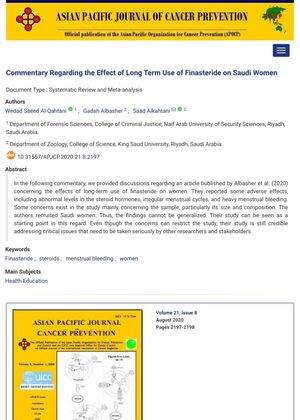TLDR Long-term use of Finasteride improves hair growth in Saudi women but may cause menstrual irregularities and mood changes.
The document "Commentary Regarding the Effect of Long Term Use of Finasteride on Saudi Women" from July 31, 2020, discussed the impact of prolonged use of Finasteride, a medication typically used to treat hair loss, on Saudi women. The study found that long-term use of Finasteride led to significant improvements in hair growth and density. However, it also noted some side effects, including menstrual irregularities and mood changes. The study did not specify the number of participants involved.
1 citations
,
January 2020 in “Bioscience Reports” Long-term use of finasteride in women can cause hormonal changes, DNA damage, and menstrual issues.
 44 citations
,
January 2013 in “International Journal of Trichology”
44 citations
,
January 2013 in “International Journal of Trichology” Finasteride 5 mg/day effectively treats hair loss in postmenopausal women without hyper-androgenism.
 100 citations
,
June 2006 in “British Journal of Dermatology”
100 citations
,
June 2006 in “British Journal of Dermatology” Hair loss severity relates to increased miniaturization in female pattern hair loss.
 139 citations
,
June 2003 in “Journal of Investigative Dermatology Symposium Proceedings”
139 citations
,
June 2003 in “Journal of Investigative Dermatology Symposium Proceedings” Androgenetic alopecia in women needs more research and better management strategies.
 65 citations
,
October 1999 in “Journal of The American Academy of Dermatology”
65 citations
,
October 1999 in “Journal of The American Academy of Dermatology” Finasteride effectively reduces hair loss by decreasing androgen levels.
 January 2011 in “Kazan medical journal”
January 2011 in “Kazan medical journal” Both finasteride and drospirenone effectively manage PCOS symptoms, but drospirenone is more effective in reducing ovarian volume and androgen levels.
 75 citations
,
November 1996 in “Fertility and Sterility”
75 citations
,
November 1996 in “Fertility and Sterility” Finasteride effectively reduces hair growth in women with idiopathic hirsutism, but requires careful contraception during treatment.






